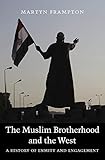The Muslim Brotherhood and the West : a history of enmity and engagement / Martyn Frampton.
Material type: TextPublication details: Cambridge, Massachusetts : The Belknap Press of Harvard University Press, (c)2018.Description: 1 online resource (ix, 661 pages)Content type:
TextPublication details: Cambridge, Massachusetts : The Belknap Press of Harvard University Press, (c)2018.Description: 1 online resource (ix, 661 pages)Content type: - text
- computer
- online resource
- 9780674984912
- BP10 .M875 2018
- COPYRIGHT NOT covered - Click this link to request copyright permission: https://lib.ciu.edu/copyright-request-form
| Item type | Current library | Collection | Call number | URL | Status | Date due | Barcode | |
|---|---|---|---|---|---|---|---|---|
 Online Book (LOGIN USING YOUR MY CIU LOGIN AND PASSWORD)
Online Book (LOGIN USING YOUR MY CIU LOGIN AND PASSWORD)
|
G. Allen Fleece Library ONLINE | Non-fiction | BP10.385 (Browse shelf(Opens below)) | Link to resource | Available | on1023497320 |
This book examines the history of the relationship between the world's largest and most influential Islamist organization, the Muslim Brotherhood, and the western powers that have dominated the Middle East, the United Kingdom and the United States. It examines the relationship that has existed in the shadows of public attention and scholarly interest; where it has been considered, this subject has been dominated by conspiracy theory and hyperbole. By contrast, this book draws on the memoirs and publications of the Brotherhood (in both Arabic and English), as well as extensive archival research in both London and Washington to offer an in-depth understanding of how relations between this movement and the West have oscillated between a posture of enmity (on both sides), to moments when engagement has been contemplated and occasionally attempted. In the process, the book offers an important new perspective on the history of the Brotherhood, in particular highlighting the centrality of ideas about 'the West' to the group's worldview. At the same time, the book offers fresh insight into the nature of Anglo-American foreign policy making in the Middle East over the course of the twentieth century.--
Includes bibliographies and index.
Part One. Origins and first encounters, 1928-1939 -- Wartime liaisons, 1940-1944 -- Best of enemies, 1944-1949 -- The war of the canal zone, 1950-1952 -- Part Two. The upheavals of revolution, 1952-1954 -- In the age of Nasser, 1955-1970 -- Reassessments amidst the "fundamentalist" revival, 1970-1989 -- Blurred lines and new agendas, 1989-2010.
COPYRIGHT NOT covered - Click this link to request copyright permission:
There are no comments on this title.
